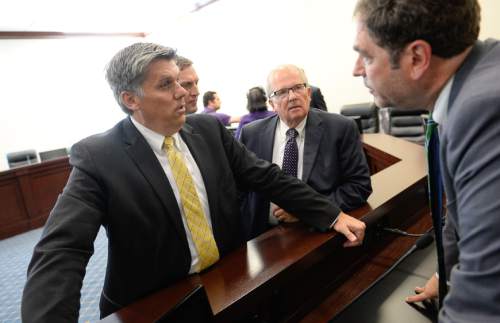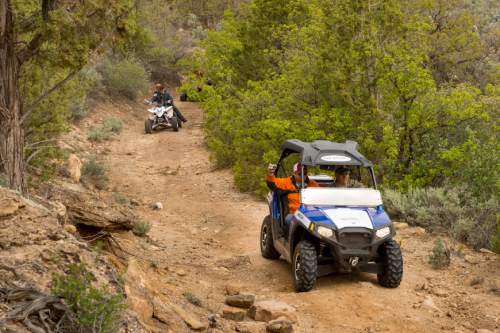This is an archived article that was published on sltrib.com in 2015, and information in the article may be outdated. It is provided only for personal research purposes and may not be reprinted.
A federal judge dropped a road block on Phil Lyman's bid to vacate his criminal conviction arising from an ATV protest he led into Utah's Recapture Canyon.
Federal prosecutors are seeking a prison term of 10 to 16 months for the San Juan County commissioner for organizing and promoting the May 10, 2014, event in defiance of a BLM order barring motorized travel to protect the canyon's archaeological resources.
In twin rulings released Thursday, Judge David Nuffer overruled Lyman's claim that the federal Bureau of Land Management lacked the authority to close the route, which the state of Utah now contends is a "public highway." Lyman and his supporters say federal prosecutors improperly withheld evidence that the county could — under RS2477, a repealed 19th-century statute — raise a right-of-way claim to the canyon east of Blanding.
The supposed evidence, a 1979 map showing a broken red line along Recapture Creek, is irrelevant to the guilt or innocence of Lyman and his co-defendant Monte Wells, concluded Nuffer.
"The results of the proceedings in this case would not have been different even if the 1979 map had been disclosed, because defendants would not have been permitted to use it as evidence or otherwise raise a RS2477 defense," Nuffer wrote in a ruling rejecting Lyman's motion for a new trial.
"Obviously, we wish the court had granted our motion, and we would not have filed it if we did not think there is significant merit to the issues raised and the logic argued. But now that the court has ruled, we will proceed forward and address the legal issues ahead," wrote Lyman's lawyer Peter Stirba in an email.
Next up is an Oct. 28 restitution hearing where Nuffer will determine the extent of damage caused by protesters to the canyon's archaeology.
And on Dec. 18, Lyman is set to be sentenced on two counts: driving in an area closed to motorized use and conspiracy. Each count carries up to one year in prison and $100,000 in fines.
Then there is the contentious issue of restitution.
The BLM commissioned a damage assessment, which has not been publicly disclosed. Prosecutors are seeking $96,000 from the defendants, a sum that is far less than the amount Lyman's supporters say was identified in the report.
On Monday he blasted "BLM's outrageous claims of damages." His legal team commissioned its own assessment that concluded the federal report is "spurious," Lyman wrote in an email earlier this week.
"Roads in San Juan County cross archaeological sites," he wrote. "There are ways to deal with that fact, but criminalizing people seems a less than optimal course."
Lyman and Wells were not convicted for driving over Native American graves, but for willfully violating a road closure order and encouraging dozens of others to join the illegal ride.
During the protest, Lyman adhered to an existing road where any archaeology was long ago erased and encouraged other protesters to do the same. But most of the 50 riders, including Lyman's three co-defendants, drove past the pipeline down an ATV trail that the BLM says was illegally built over habitations and middens left by Native Americans who occupied the canyon 1,000 years ago, according to trial evidence.
As participants in a conspiracy, Lyman and Wells, a blogger who promoted the ride on social media, are legally liable for damage caused by other riders. Nuffer will decide what they should pay in restitution, if anything, after next week's hearing, which will likely air competing testimony from experts hired by defense lawyers and the BLM.
No damage evidence was allowed at trial.
Also Thursday, Nuffer turned down another motion for an acquittal brought by Lyman's latest team of lawyers, led by Stirba. Lyman's two motions were brought on similar grounds — historic travel down the canyon below what is now Recapture Dam, built in the early 1980s, qualify this "road" as a county right-of-way under RS2477. This statute grants counties rights-of-way across public lands, but to prevail on a claim today, a county must show 10 years of continuous public use prior to the law's repeal in 1976.
Old maps show the existence of a county route below the dam site, defense motions claim. Accordingly, the BLM had no business closing it to motorized travel, so Lyman and Wells could not have violated the law.
However, the Recapture claim has yet to be adjudicated and until then, the federal government holds presumptive title to the route, according to Nuffer's ruling. The county never expressed a formal interest in claiming an RS2477 route through the canyon, although it has long sought a so-called Title V right-of-way. Years of federal inaction on the county's petition is what prompted the protest.
In August, the state filed a notice of intent to file a quiet title action that would add the route to some 12,000 others being litigated in federal court. Again, Nuffer held the state's threat of legal action is "immaterial" as to whether Lyman broke the law.
Nuffer is the fifth judge or magistrate assigned to hear the politically charged case. Four others have recused themselves since Lyman and Wells were found guilty in May.









